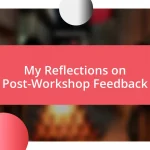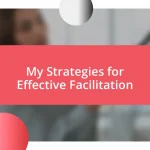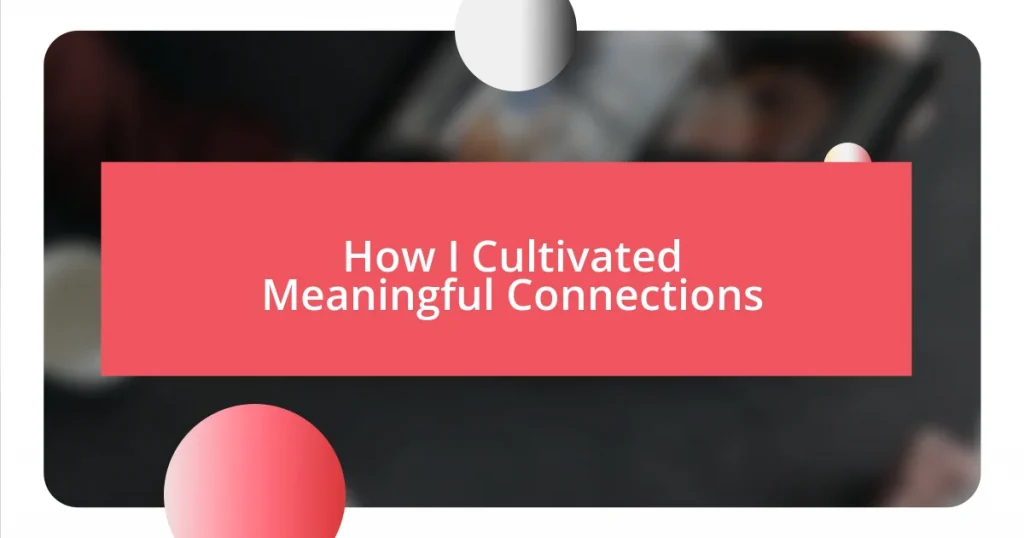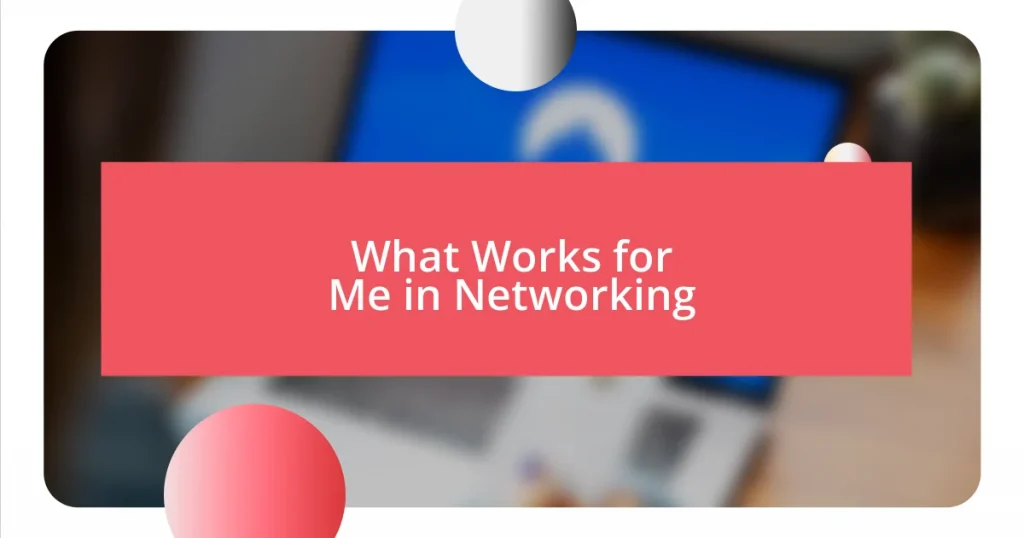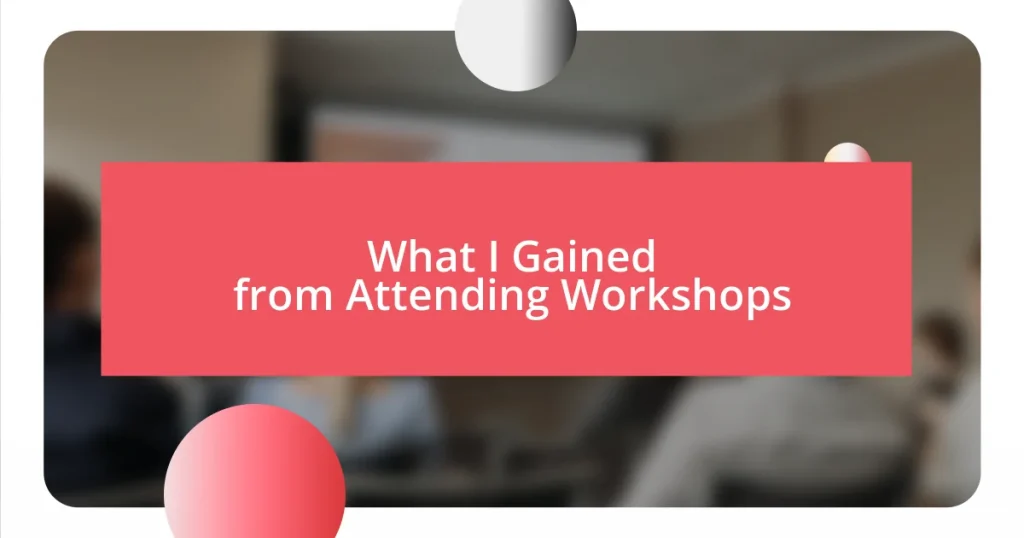Key takeaways:
- Meaningful connections are nurtured through vulnerability, authenticity, and shared experiences, leading to deeper relationships.
- Building trust involves consistent communication, transparency, empathy, and proactive conflict resolution, which strengthens bonds over time.
- Engaging in vulnerable conversations fosters deeper understanding and connection, while ongoing reflection and intentionality enhance the growth of relationships.
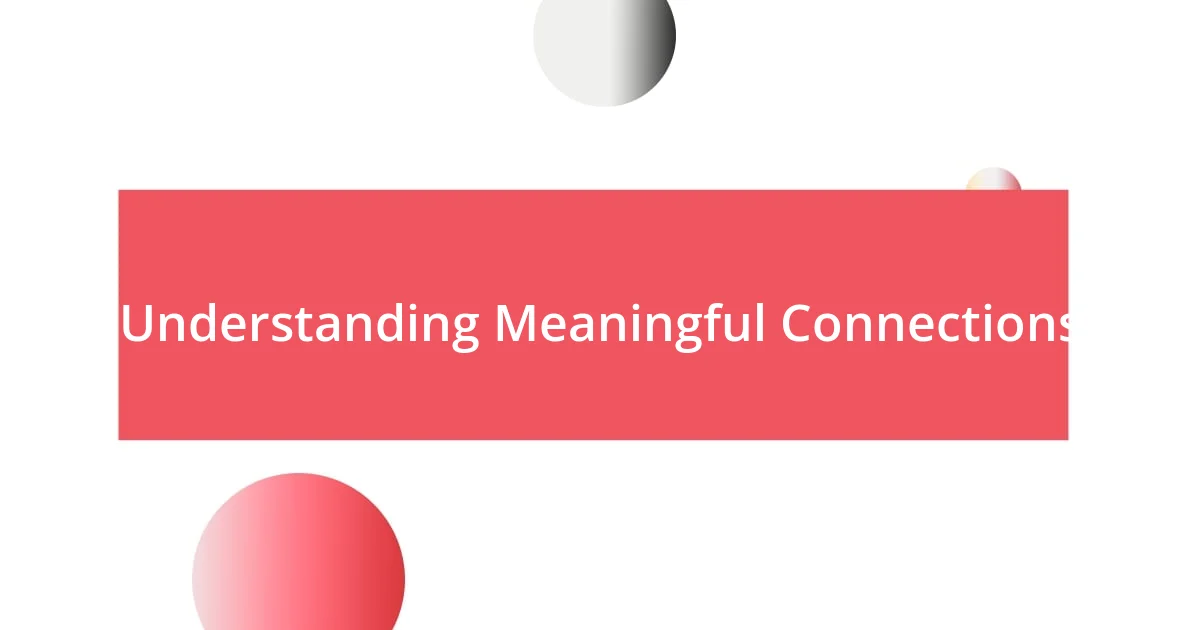
Understanding Meaningful Connections
When I think about meaningful connections, I often reflect on moments that felt profound and transformative. Have you ever locked eyes with someone across a crowded room and felt an instant understanding? In my experience, such moments can be the catalyst for deeper relationships, built on shared feelings and mutual respect.
One particular friendship comes to mind—I met a stranger at a coffee shop, and we ended up talking for hours about our dreams and fears. It was in that exchange that I realized meaningful connections stem from vulnerability. Isn’t it interesting how being open and honest can create bonds that feel more like a lifeline than a simple relationship?
Ultimately, the essence of meaningful connections lies in the little things—those genuine smiles, the shared laughter, and even the uncomfortable silences where you simply feel understood. I’ve found that the effort put into maintaining these connections pays off tenfold, enriching life in ways I had never anticipated. What about you? Have you taken the time to nurture the bonds that matter most?
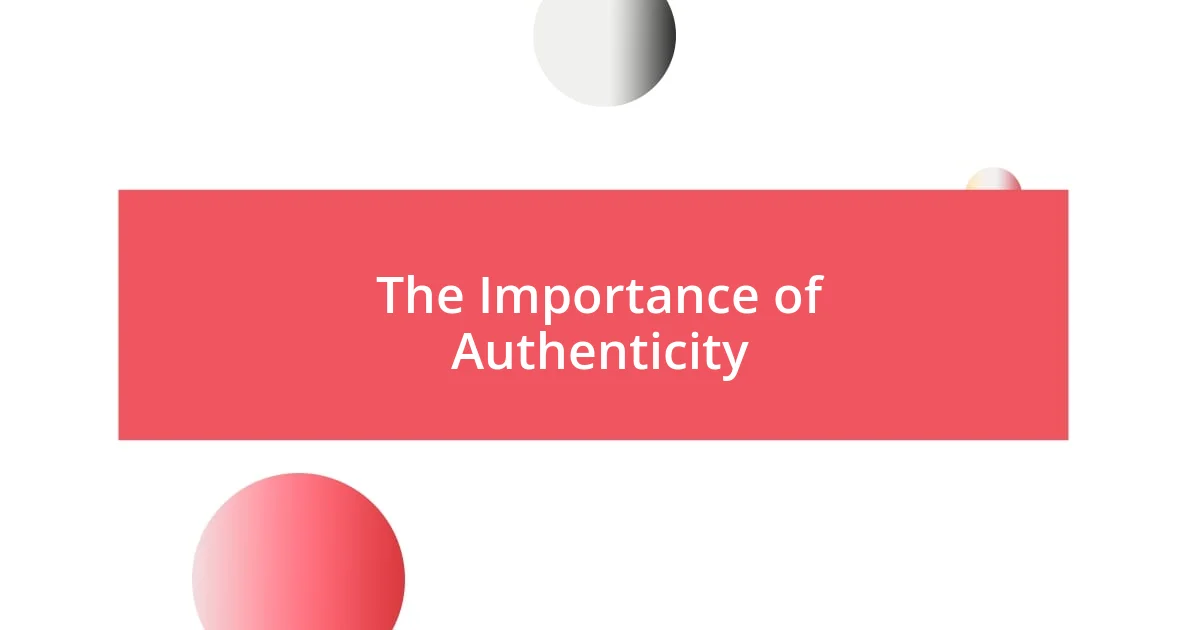
The Importance of Authenticity
Authenticity is the cornerstone of any meaningful connection. When I reflect on my relationships, I realize that the most profound bonds have always been rooted in genuine interactions. For instance, I remember how a candid conversation with a colleague about our personal struggles transformed our professional relationship into a supportive friendship. That moment of honesty allowed us to see each other not just as coworkers, but as real people grappling with life’s challenges.
When I’m authentic, I tend to attract others who are also being true to themselves. This reciprocity creates a safe space for vulnerability, and I find that people are more inclined to share their true selves when I lead by example. I’ve had countless conversations where someone unexpectedly opened up about their passions or insecurities, which enriched our connection significantly. There’s something incredibly powerful about sharing who you truly are—it sparks a sense of belonging that I believe everyone longs for.
On the flip side, inauthentic relationships feel hollow to me. I recall an instance where I tried to fit into a social group that emphasized status and appearances. Despite being surrounded by people, I felt isolated and drained because I was unable to be myself. That experience reinforced my understanding of how vital authenticity is; without it, connections can lack depth, leaving me longing for something more genuine and fulfilling.
| Authenticity | Inauthenticity |
|---|---|
| Fosters deep connections | Creates superficial relationships |
| Encourages vulnerability | Leads to feelings of isolation |
| Promotes open communication | Results in misunderstandings |
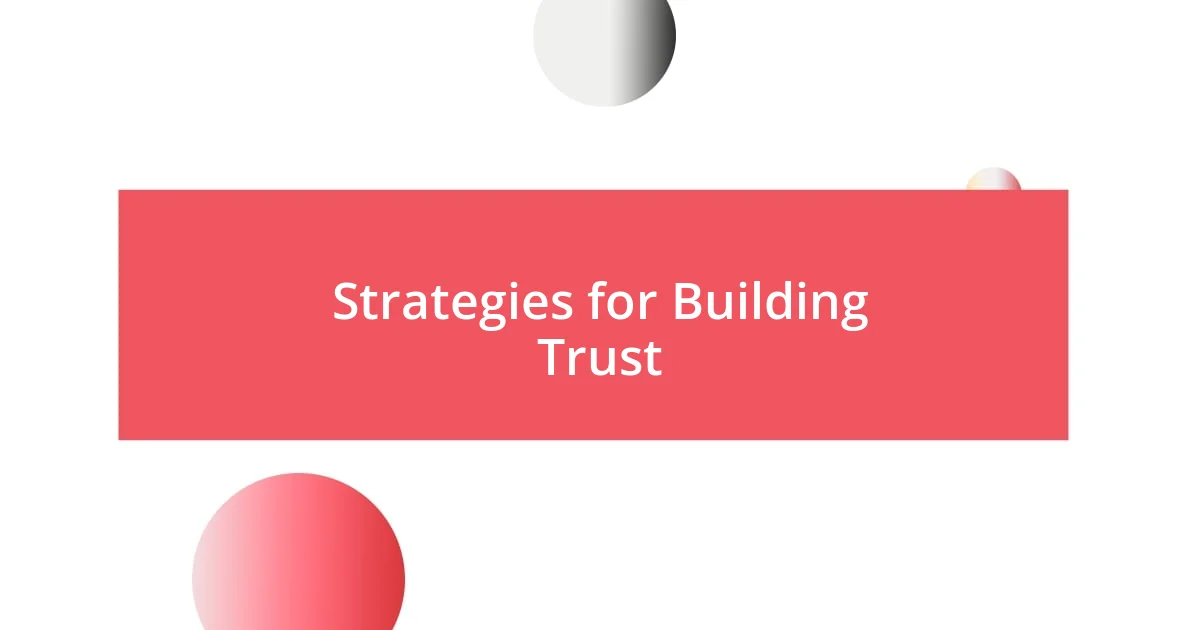
Strategies for Building Trust
Building trust is fundamental to cultivating lasting connections. One strategy I’ve found particularly effective is consistent communication. Whether it’s a quick text just to check in or a deeper conversation about life’s ups and downs, it’s the regular interactions that solidify trust. I’ve noticed that when I make an effort to stay in touch, even in small ways, it signals to others that they matter to me.
Here are a few strategies I’ve employed to foster trust:
- Transparency: I openly share my thoughts and feelings, which encourages others to do the same.
- Reliability: I make it a point to follow through on my commitments, no matter how small they may seem.
- Empathy: By actively listening and responding compassionately, I show that I value the other person’s perspective.
- Respect: Acknowledging boundaries and honoring the unique pace of every relationship fosters a sense of safety.
In my experience, trust is built slowly, one conversation and action at a time. Yet, I’ve also learned the importance of being vulnerable. There was a time when I hesitated to share my fears with a close friend. Once I finally opened up, I was relieved to find that she had similar struggles. This mutual vulnerability not only deepened our trust but also turned what could have been a casual friendship into a solid support system. In essence, vulnerability fosters trust, making connections feel less like transactions and more like relationships that matter.
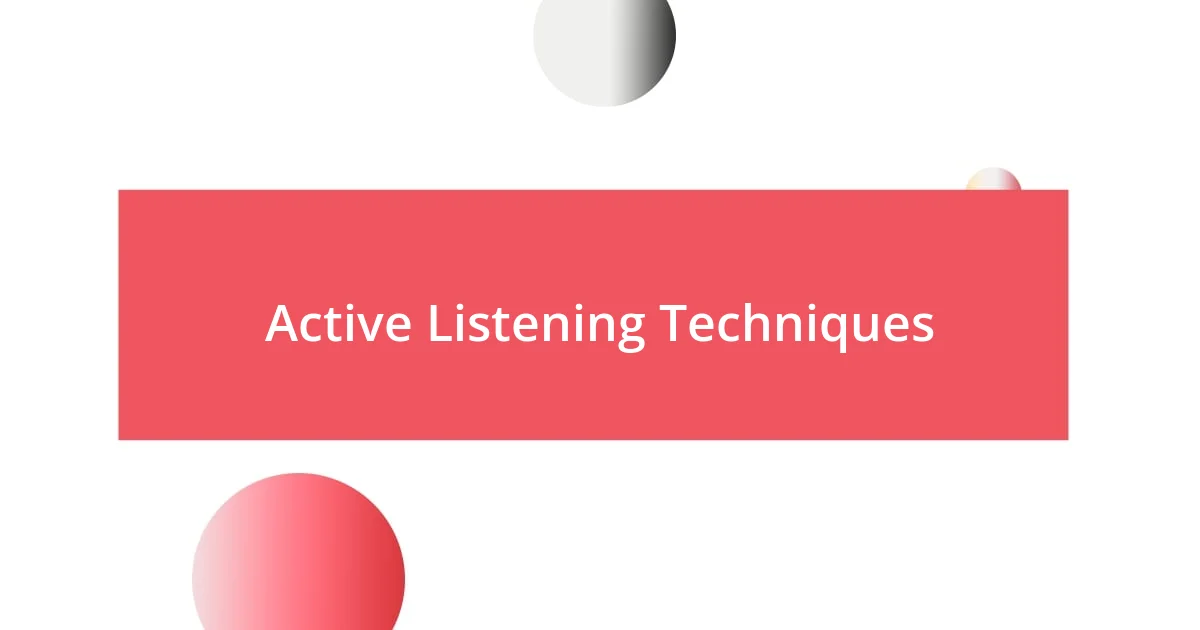
Active Listening Techniques
Active listening is a skill I’ve honed over time, and it has made all the difference in how I connect with others. For instance, one technique I practice is reflecting back what someone has said. When a friend shared her frustrations about work, I found myself saying, “It sounds like you’re really overwhelmed and uncertain about your next steps.” By acknowledging her feelings, I noticed her visibly relax; she felt heard and understood. Isn’t it incredible how a simple confirmation can shift the dynamic of a conversation?
Another approach I value is asking open-ended questions. This delights me because it not only encourages deeper dialogue but also shows the other person that I’m genuinely interested. While chatting with a neighbor recently, I asked, “What inspired you to pursue your current career?” The discussion that followed opened up avenues I hadn’t anticipated, revealing shared interests and experiences. It’s fascinating to consider how a single question can illuminate layers of connection!
Lastly, I always prioritize maintaining eye contact and minimizing distractions when someone is speaking. I recall a time at a family gathering when I put my phone down, fully focusing on my cousin sharing his travel stories. The change in our conversation was palpable; he felt comfortable enough to delve into details and emotions he wouldn’t typically share in a crowded room. Have you ever experienced the difference that full engagement can make? It’s in those moments that relationships deepen, and I truly believe active listening transforms interactions into meaningful connections.
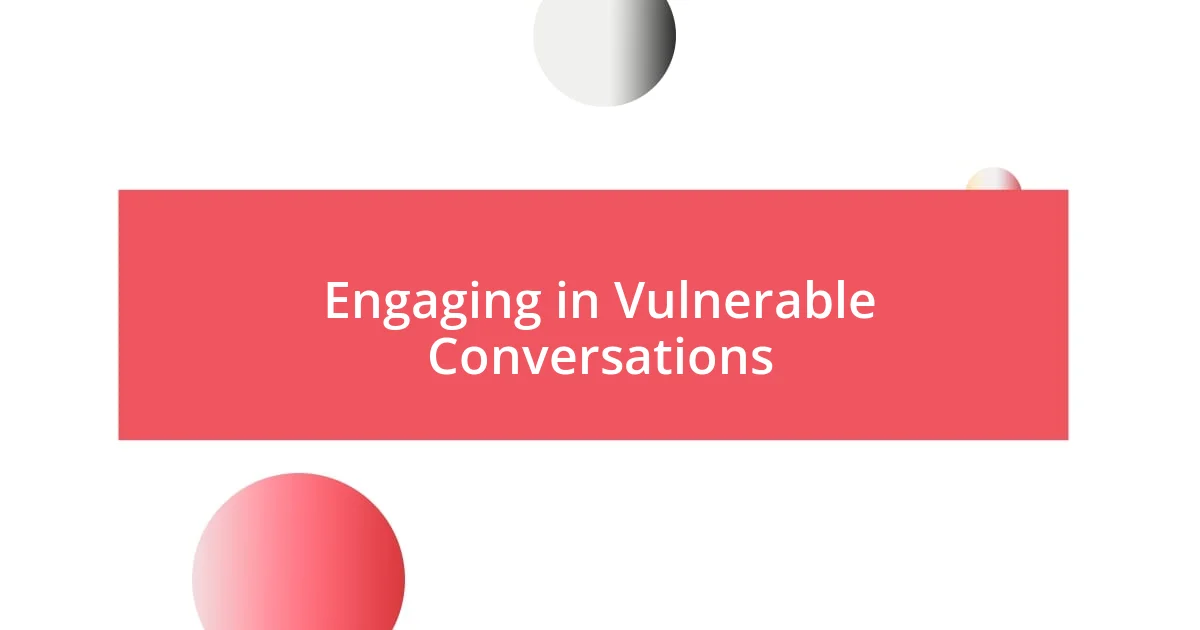
Engaging in Vulnerable Conversations
Engaging in vulnerable conversations has the power to transform relationships. I recall a chilly evening when my friend and I sat down over coffee, both of us burdened by heavy thoughts. I hesitated at first, feeling a lump in my throat, but I took a breath, shared a recent setback at work, and watched her face soften in understanding. In sharing my vulnerability, I opened a door for her to unveil her own struggles. Have you ever noticed how shared experiences can foster a connection that feels truly profound?
What struck me during these moments is how vulnerability creates a safe space for authenticity. When I expressed my anxieties last summer about whether I was on the right career path, I felt an instant shift in our discussion. My friend’s candid response, reflecting her own career doubts, ignited a conversation that was more than just surface-level chatter. Instead, it blossomed into a heartfelt dialogue about dreams, fears, and the pursuit of fulfillment. It made me think—aren’t we all searching for spaces where we can be our true selves without fear of judgment?
It’s fascinating how these vulnerable exchanges also encourage others to be open. I remember a conversation with a family member who had always kept her emotions closely guarded. After sharing my own experience of vulnerability and the strength I found in it, she unexpectedly opened up about her battles with anxiety. Watching that barrier break was incredibly touching. It reminded me that vulnerability is often reciprocal; by daring to be open, we invite others to do the same, deepening our connections and enriching our relationships in the process.
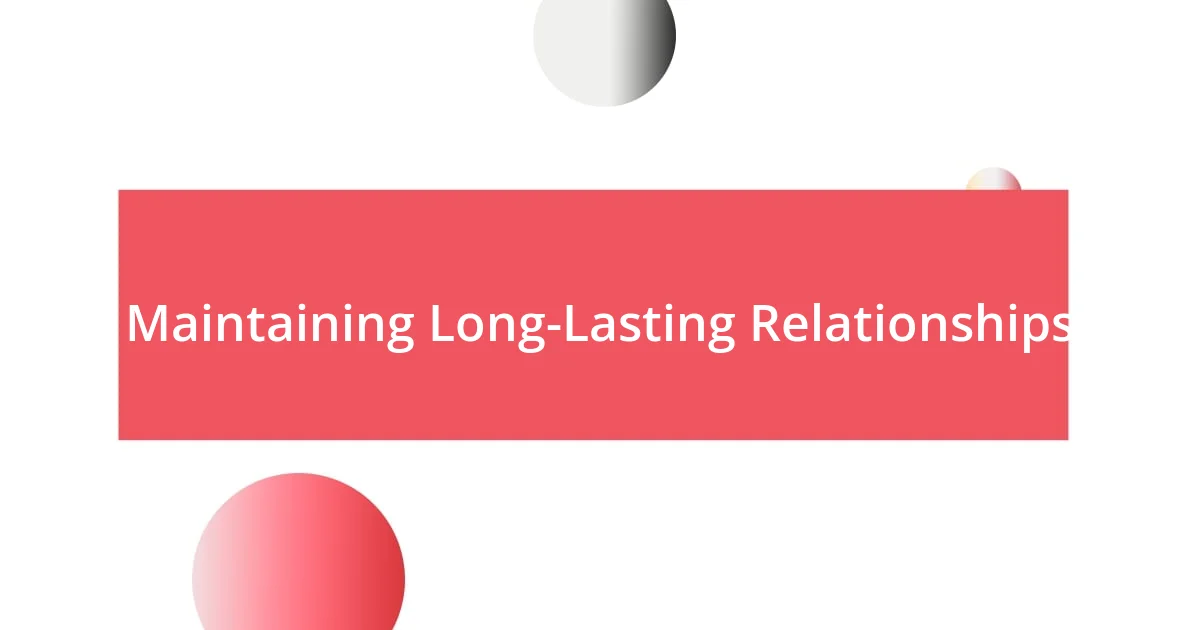
Maintaining Long-Lasting Relationships
Maintaining long-lasting relationships requires consistent effort and attention. I find small, regular check-ins are incredibly effective. For example, I make it a point to send a quick text or a voice message to friends, even if it’s just to share a funny meme. It’s amazing how those little interactions keep our connection alive and show that I’m thinking of them.
Another aspect that has worked wonders for me is celebrating milestones, no matter how small. I remember my friend’s promotion last year; instead of just sending a quick “Congrats!”, I organized a small gathering with close friends to honor her achievement. Watching her face light up with joy made me realize how meaningful these gestures can be—don’t you find that shared celebrations create beautiful memories that knit us closer together?
Furthermore, I believe it’s vital to be proactive in resolving conflicts. I once had a falling out with a close friend over a misunderstanding. Rather than letting it fester, I invited her for a heart-to-heart. By addressing our feelings openly, we not only cleared the air but also strengthened our bond. From my experience, facing problems head-on often leads to deeper trust and understanding. How often do we shy away from tough conversations only to regret it later?
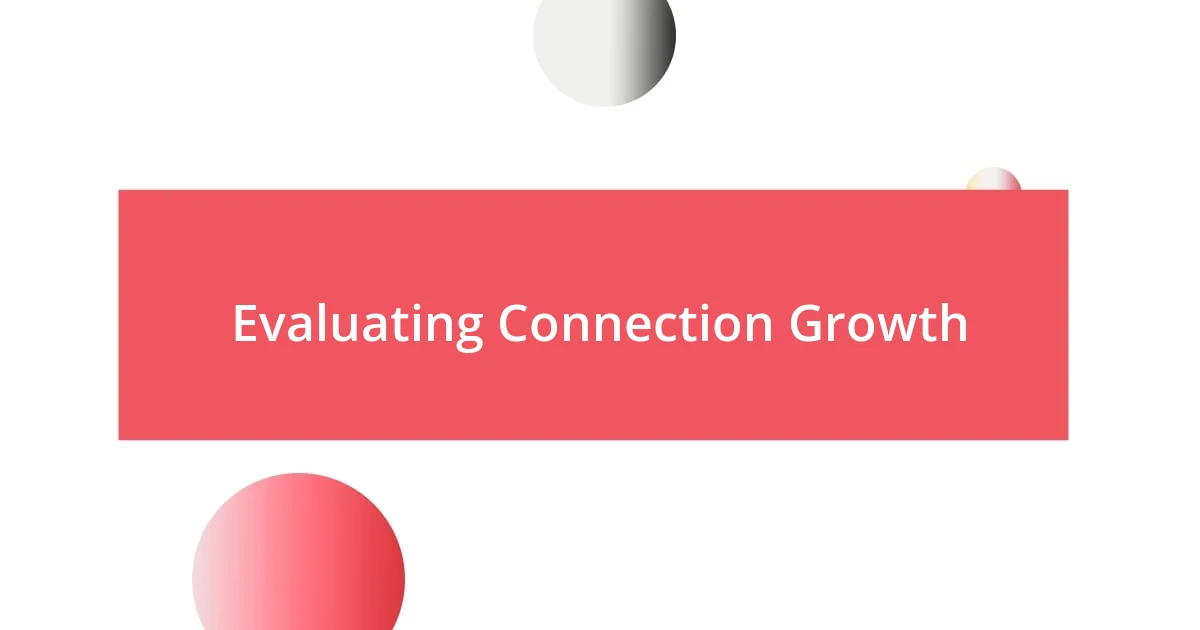
Evaluating Connection Growth
Evaluating how my connections have grown is an ongoing process that involves reflection and intentionality. I often take time to assess if the relationships in my life nourish my spirit. There was a period when I felt distanced from a close friend; by noting our lack of communication, it prompted me to reach out, leading to a deeper understanding of each other’s needs. Have you ever noticed how a simple acknowledgment of distance can open the gate to renewed closeness?
A significant indicator of growth for me is the emotional depth of our conversations. If I look back to my relationship with a colleague, what started as casual small talk has evolved into discussions about life choices and aspirations. I vividly remember the day we both revealed our hopes for starting our own ventures. That moment made me realize that true growth is often marked not just by the quantity of interaction but by the quality of those deeper exchanges. Isn’t it amazing how sharing dreams can solidify bonds?
Moreover, I actively monitor the changes in how I feel after spending time with someone. There was a time I met a new acquaintance through a mutual friend, and our first chat felt effortless, almost as if we’d known each other forever. Every interaction since has left me feeling uplifted. The takeaway for me has been clear: when connections elevate my mood, it’s a sign of growth worth nurturing. So, how do your connections make you feel?






